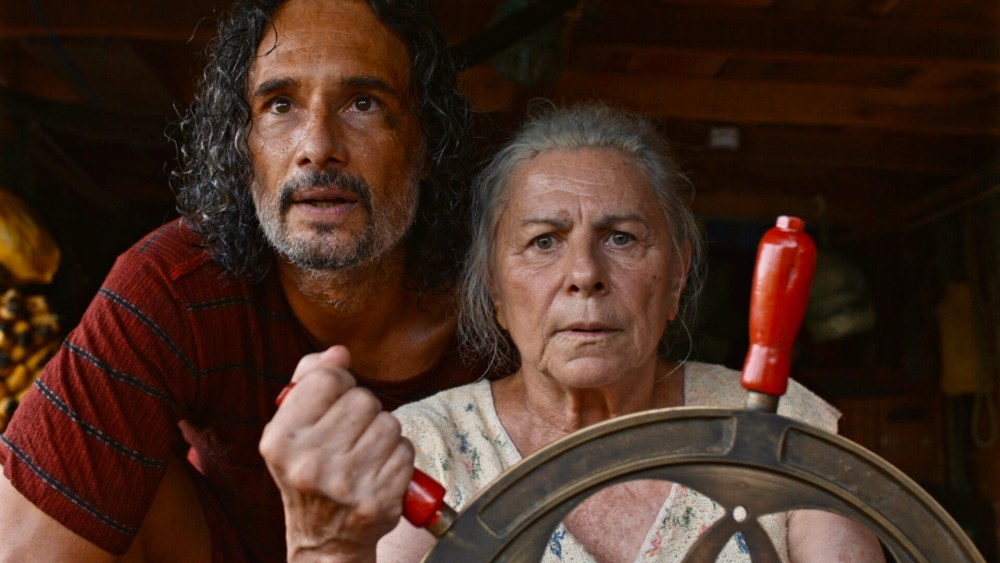Gabriel Mascaro’s “The Blue Trail” has had quite a stellar run: the winner of the Silver Bear at this year’s Berlin Film Festival, the film continued to rack up awards in its festival journey well into the fall season as it arrives in Toronto this week.
The film also has much to celebrate domestically, having just become the biggest national arthouse release of the year in Brazil with 57,000 admissions on the first weekend and having just hit a landmark 100,000 this week as it expands nationwide from 71 to 89 cities.
Lucky Number handles sales on “The Blue Trail,” which has sold to 66 territories so far. The film arrives in Toronto having just landed Canadian distribution by Films We Like. The president of the distribution label, Ron Mann, told Variety they are “proud to bring this award-winning film to Canadian audiences,” highlighting the film as a “powerful protest against ageism.”
“The trajectory since Berlin has been incredible,” producer Rachel Daisy Ellis of Desvia told Variety. “It was the most sold film out of the festival, and we have continued to have many sales since, working with distributors committed to screening the film in cinemas.”
“The Blue Trail” takes place in a near-future Brazil where the government relocates the elderly to senior housing colonies so the younger generations can fully focus on productivity and growth. Tereza (Denise Weinberg), nearing 80, refuses to accept her fate, embarking instead on a journey through the Amazon to realize one last wish before losing her freedom.
The producer attributed part of the film’s success to its messaging: “It’s a film that speaks to ageism and resilience. It’s a super important story at a time when our global population is getting older, and we still believe that happiness and adventure are reserved only for the young. Coming-of-age stories are always tied to the young, but in this film, we watch the coming-of-age of a 72-year-old woman. The film brings with it a much-needed hope, and it has been received with such warmth by audiences.”
“The Blue Trail” had its Brazilian premiere at the prestigious Gramado Film Festival in August, going on to sell out preview screenings, including a special screening for cast and crew in the Northern city of Manaus. Ellis highlighted the importance of having a film establish such a strong alliance between the North and Northeast of Brazil, especially considering the longstanding focus on the Southeast and cities like Rio de Janeiro and São Paulo. Brazil’s Northeastern cinema comes with a great tradition, and its exports such as Mascaro, Kleber Mendonça Filho, and Karim Aïnouz have become prominent staples in prestigious festivals such as Cannes and Berlin.
“‘The Blue Trail’ builds a very strategic bridge between two regions, mixing the cinema of the North with that of the Northeast, Pernambuco and Amazonas,” Mascaro told Variety. “The beautiful thing about it is to realize we have made a Brazilian film, set in the Amazon, that also speaks to the universal in its approach of freedom, dreams, and desires, all embodied by an elderly character.”
For Ellis, it is “super important” to see a film like “The Blue Trail” do well box-office-wise because “it proves Brazilian arthouse cinema can reach larger audiences and is not only for cinephiles. Longtime fans of Gabriel’s work are going to the cinemas, but also new audiences who are becoming acquainted with his work through the film, which we think is beautiful.”
“We are undergoing a beautiful moment for Brazilian cinema, with films like ‘I’m Still Here’ and ‘Baby’ performing so well, and upcoming films like ‘The Secret Agent’ getting audiences interested,” adds the producer. “We were also moved to be able to show ‘The Blue Trail’ to President Lula, a highlight of the film’s trajectory as it reinforced the role of cinema as a vital element of Brazil’s cultural output.”
“I think it’s a beautiful year for Brazilian cinema,” echoed Mascaro. “We had a history-making moment with ‘I’m Still Here’ earning Brazil its first Oscar, a much-awaited event for our national cinema. Within the same year, we had ‘The Blue Trail’ winning the Silver Bear in Berlin and ‘The Secret Agent’ winning two awards in Cannes. I think it’s beautiful to know it wasn’t an isolated episode. We’re living in a moment where Brazil is reaping the fruits of public policies, realizing the strength of its talent and promoting a decentralization of public resources, allowing other regions in the country to build their very own cinematographic legacy, like Pernambuco.”
Ellis also pointed out how “The Blue Trail” still has a strong journey ahead, especially as it eyes possible selection as Brazil’s Oscar contender, though Filho’s Cannes-winner “The Secret Agent” is the favorite to land the nomination.
“We are a strong candidate to represent Brazil at the Oscars, as well as possibly landing Goya and Golden Globes nominations within the next few months,” she says. “Again, it’s a unique moment for Brazil, having two very strong films as possible Oscar contenders. It would be beautiful to see two Brazilian films represented at the Oscars in different categories.”
Chilean producer Giancarlo Nasi of Quijote Films also highlighted how Mascaro has recently become a member of the Academy of Motion Picture Arts and Sciences, calling him “one of the most influential filmmakers of our generation.” “The Blue Trail’ confirms his standing — a work as urgent as it is moving, as relevant for audiences as it is for professionals and critics, and unquestionably one of the films to watch this Awards season.”
